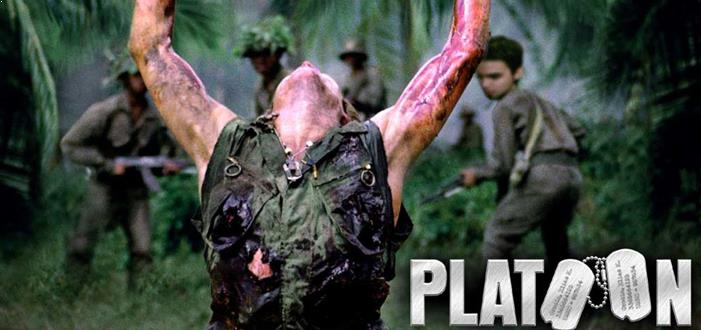
Platoon
One must be certain to assess the message in itself, and not provide one’s judgment based on a grander context of the artist’s anti-Americanism. Yes, Platoon is anti-American, versus the more anti-war horror portrayed more magnificently in Apocalypse Now. But arriving at this point cannot use the shortcut of Oliver Stone’s extracurricular.
What exactly makes this film anti-American propaganda? The beginning chants of “why do they always send the poor,” and the atrociousness on display by the soldiers which exemplify the white devil thrust within Vietnam. These are not saviors. These are not heroes. The film is dedicated to these soldiers, but we see them as pawns in a larger political game where their only role is being told where to go once their number is called.
True, such Anti-Americanism can be interpreted as anti-fascist, where the critique of the war through the absurd directionless and aimless jungle crawling is but an outstretched lever of a war machine built up but never built down from World War II. Yet why is America worthy of scrutiny in Vietnam but not in the Second World War? The question can be answered rhetorically: who were its enemies?
Charlie Sheen’s character is seeking glory by voluntarily signing up for duty. He leaves a changed man, having exhausted his naivete about war. He strips his superficiality away with each march, and each comrade meaninglessly killed. Onward he faces what Stone argues is in the heart of every man: sin.
Sin comes packaged in the role of the Sergeant. Quite simply, the Sergeant plays God in the jungle, deciding who lives and who dies. Perhaps he has found his sanctuary as a human, succeeding in death.
Yet warfare has not always been about the psychopathic dominating the landscape. As recently as World War II war was conducted with conduct and with discipline. Communists however had no such pretensions. Total domination was their aim. Perhaps out of the endless siege by the northern Vietnamese, the successful American soldier was one that sought the thrill of the kill, versus the honor of defending a people from a scourge.
It is fitting that the Vietnamese remain virtually faceless in the film. This war was not about them, but about the soul of the United States.

